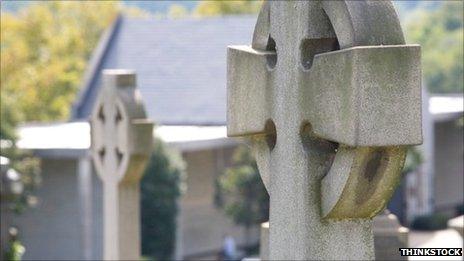Where could I be buried if graveyards run out of space?
- Published

Cemeteries across the UK are becoming overcrowded. Lucy Townsend explores whether there might be any space left for her.
Resting beside our loved ones when the time comes is a reassuring notion for the living. Families pay thousands of pounds for land where generations can rest in peace together for eternity.
But in the UK at least, the ground is filling up.
Should I wish to, I could not be buried near to my relatives at Yardley Cemetery in south Birmingham. Space there ran out in 1962.
Similarly, I would struggle to find a place near another strand of my family in Halesowen. There is no room left underground there and other facilities at nearby Lye and Wollescote are expected to run out in the next four years.
What if I head south? I lived in Brighton once and a seaside burial sounds quite nice. But four of the seven cemeteries run by Brighton and Hove Council are already full, and of the three remaining, one is for Orthodox Jews only.
That leaves me two potentials, but as I plan to live till I am 100, there are 72 years of people dying before I can claim my spot. The odds of me being able to do that seem daunting.
Planning my eternal resting place has become less morbid and more of a logistical conundrum.
I could be cremated, as with the majority of Britons, and have my ashes scattered. Or I could leave my body to science.
One option is Promession, expected to arrive in the UK in the next 18 months, where my body would be frozen to -18C, then submerged in liquid nitrogen at -196C and vibrated until I shatter. Any metals I might have accumulated - such as a new hip or fillings in my 100-year-old teeth - would be extracted and recycled and my organic remains would go back into the life cycle of the soil.
But these alternatives are non-starters for some. Religious reasons or other long-held beliefs mean that for around 30% of the population, burial is the only option.
But in some of the crowded cities of the UK, the situation is serious.
"Quite frankly, we've run out of space," says Barrie Hargrove of Southwark Council in south London. As cabinet member for environment, he is trying to get to grips with the overcrowding issue.
With only three months worth of space left, he is searching for ever more creative ways to find usable land. Included in the list of potential remedies is the "dig and deepen" method, where remains are dug up and reburied deeper to create stacking space for new coffins - a double-decker graveyard.
Hargrove says the idea makes people wince, but it has been used by the Church of England for years and research shows the public to be broadly in favour.
"It's not something people want to talk about or think about," he adds.
More controversially, Southwark Council is also considering converting a community playground into a burial site. More than 2,000 people have signed a petition to keep the land, which was bought in 1910 as grave space but given to the public because it wasn't needed at the time. Now it is needed, and if developed it would provide 30 more years of burials.
This situation is not universal. In some countries a more pragmatic approach to human remains means they have largely avoided the overcrowding issue.
In Germany, graves are reused after only 30 years, the existing remains usually being exhumed and cremated. In Australia and New Zealand, "dig and deepen" is carried out in urban areas as a matter of routine.

Some countries use a "double decker" approach to avoid overcrowding
Tim Morris, chief executive of the Institute of Cemetery and Crematorium Management, says it is time to change tack.
"It's a no-brainer," he says. "Re-use is common in lots of other countries, and was common practice in the UK until the 1850s. I've spent some time with some German gravediggers and there the limit is 30 years, but people aren't happy with that, they want it lowered to 20."
People living in areas where space has already run out are being forced to go to cemeteries in neighbouring authorities, and they are charged a premium for it - around three times more than the people who live there.
"It's getting more expensive for everyone though," adds Morris. "It's like the lease on a house, the less time there is left, the more expensive it becomes to buy."
The 1856 Burial Act made it illegal to disturb existing bodies. The benefits were twofold - it discouraged grave-robbing and slowed turnover. Churchyards were so overcrowded that bodies were being dug up after only a few months to make way for the next one.
Morris has been lobbying successive governments for years for a change in the law. In 2007 the Labour government indicated support for reusing graves older than 100 years but two years later, the project was shelved. "Death doesn't win votes," he says. "There is always something more urgent, but we are at crisis point."
Fingers crossed, I have plenty more time to make my choice.
But while the radical measures remain on the shelf, the situation is unresolved, illustrating two enduring truths - death is unavoidable and space is disappearing.